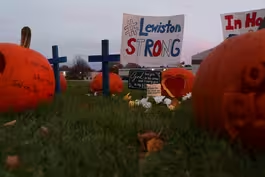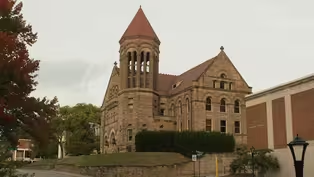
Israeli airstrike hits refugee camp in northern Gaza
Clip: 10/31/2023 | 11m 56sVideo has Closed Captions
Israeli airstrike hits refugee camp in northern Gaza, killing and wounding civilians
For a fifth day, Israel's military pushed into Gaza on the ground and reported its first soldiers killed in action there. From the skies, a punishing air campaign continued with a strike that killed many Palestinians. Hamas militants said they would release foreign hostages in the coming days, and some wounded Palestinians may soon be allowed into Egypt for treatment. Leila Molana-Allen reports.
Problems playing video? | Closed Captioning Feedback
Problems playing video? | Closed Captioning Feedback
Major corporate funding for the PBS News Hour is provided by BDO, BNSF, Consumer Cellular, American Cruise Lines, and Raymond James. Funding for the PBS NewsHour Weekend is provided by...

Israeli airstrike hits refugee camp in northern Gaza
Clip: 10/31/2023 | 11m 56sVideo has Closed Captions
For a fifth day, Israel's military pushed into Gaza on the ground and reported its first soldiers killed in action there. From the skies, a punishing air campaign continued with a strike that killed many Palestinians. Hamas militants said they would release foreign hostages in the coming days, and some wounded Palestinians may soon be allowed into Egypt for treatment. Leila Molana-Allen reports.
Problems playing video? | Closed Captioning Feedback
How to Watch PBS News Hour
PBS News Hour is available to stream on pbs.org and the free PBS App, available on iPhone, Apple TV, Android TV, Android smartphones, Amazon Fire TV, Amazon Fire Tablet, Roku, Samsung Smart TV, and Vizio.
Providing Support for PBS.org
Learn Moreabout PBS online sponsorshipGEOFF BENNETT: Welcome to the "NewsHour."
For a fifth day, Israeli troops pushed into Gaza on the ground, and Israel's military reported its first soldiers killed in action there.
From the skies, a punishing air campaign continues tonight, with a strike that killed many Palestinians in the northern part of the Gaza Strip.
Hamas militants said they would release foreign hostages in the coming days, and some badly wounded Palestinians may soon be allowed into Egypt for treatment.
Leila Molana-Allen has the story.
LEILA MOLANA-ALLEN: Gaza, cloaked in black smoke for yet another day, as Israel's airstrikes and ground invasion show no signs of slowing.
Tanks line the border, and Israel said it has infiltrated the network of Hamas tunnels underneath the Gaza Strip.
An Israeli strike hit the Jabalia refugee camp, where Israel said it targeted Hamas infrastructure, killing its leader in Northern Gaza.
But the blast also killed and wounded hundreds of civilians.
Crowds of men dug through the rubble to reach trapped victims underneath.
The pain of the loss is unbearable in Gaza, trapped in this war where few are spared.
MAN (through translator): Here they are, children.
We are filling up bags with children.
We are placing them in bags.
LEILA MOLANA-ALLEN: Body bags lined up outside a nearby hospital, inside, chaos, as overworked doctors rush to treat the injured.
DR. SUAIB IDAIS, Indonesian Hospital (through translator): Children, women, elderly.
We have no idea what to do.
There are injured everywhere.
LEILA MOLANA-ALLEN: Gazans are trying desperately to survive the airstrikes and, under siege, a growing humanitarian crisis.
Most extreme is the water shortage.
With an Israeli blockade on fuel, water can't be pumped or desalinized.
Residents wait in line for hours to fill their jugs with clean water.
MOHAMMED, Gaza Strip Resident (through translator): The people are miserable.
There are lines everywhere.
Even if you find a drop of water, you will find a line of thousands.
You go out in the morning at 7:00 a.m. and you go home after sundown just so you can get two good gallons of water for your home.
LEILA MOLANA-ALLEN: In Washington, U.S. officials reiterated support for Israel and sought to clarify the American role in the conflict.
ANTONY BLINKEN, U.S. Secretary of State: All of us know the imperative of standing up with our allies and partners.
LEILA MOLANA-ALLEN: Secretary of State Antony Blinken and Defense Secretary Lloyd Austin testified before the Senate over an aid package that would send more than $105 billion to Israel and Ukraine.
LLOYD AUSTIN, U.S. Secretary of Defense: I think it's important to remind ourselves that what happens in Ukraine and what happens in Israel matters not to just Ukraine and Israel.
It matters to us.
It affects our national security as well.
(SHOUTING) LEILA MOLANA-ALLEN: The hearing was interrupted more than once by protesters, their hands painted blood red.
PROTESTERS: Cease-fire now!
LEILA MOLANA-ALLEN: Blinken defended U.S. policy, while stressing the need for humanitarian aid.
ANTONY BLINKEN: In each and every one of these conflicts, people are suffering.
And I think it's profoundly who we are to want to do everything we can to assist them.
LEILA MOLANA-ALLEN: The request has bipartisan support in the Senate, but the Republican-controlled House wants to carve out funding for Israel, leaving Ukraine for later.
ANTONY BLINKEN: This is all one fight.
And we have to respond in a way that recognizes that.
If we start to peel off pieces of this package, they will see that, they will understand that we are playing Whac-A-Mole, while they cooperate increasingly.
LEILA MOLANA-ALLEN: The war in Ukraine has not seen major changes on the battlefield for months, while the war between Israel and Hamas threatens to explode into the wider region.
Israeli tanks line the border with Lebanon, trading fire with Hezbollah and other militant groups.
Israel shot down drones and missiles launched from Yemen by Houthi militants.
The Iranian-backed group said their attacks will continue until Israel stands down.
YAHYA SAREA, Houthi Military Spokesman (through translator): The Yemeni armed forces affirm that this operation is the third in support of our oppressed brothers in Palestine.
LEILA MOLANA-ALLEN: Meanwhile in the occupied West Bank, tensions threaten to boil over after another raid, a funeral for a 70-year-old man killed by Israeli forces.
As the violence spreads, Palestinians racked with grief and pulsating with anger fill the streets.
For the "PBS NewsHour," I'm Leila Molana-Allen in the West Bank.
GEOFF BENNETT: For analysis of Israel's ground offensive in Gaza and concerns about the war potentially spilling over into a broader regional conflict, we turn to former Commander of U.S. forces in the Middle East retired General Frank McKenzie.
He's now executive director of the Global and National Security Institute at the University of South Florida.
Thank you for being with us.
GEN. FRANK MCKENZIE (RET.
), Former Commander, U.S. Central Command: I'm glad to be with you, Geoff.
GEOFF BENNETT: Israeli troops have fought on the streets of Gaza before, during the First and Second Intifadas.
What makes this current and this current ground operation different?
GEN. FRANK MCKENZIE: Geoff, this is a far more comprehensive operation.
They're proceeding methodically with overwhelming firepower, and I think really with, I think four objectives.
I think they want to minimize casualties, IDF casualties, Israeli army casualties.
I think they want to minimize casualties among the population of Gaza.
I think they want to get after the command-and-control structure of Hamas, political and military leadership.
And I think they want to recover their hostages.
These are difficult objectives and it's going to be slow going for them, and it's not going to go very quickly.
GEOFF BENNETT: What risks and challenges does Hamas' extensive labyrinth of tunnels pose?
GEN. FRANK MCKENZIE: When you're fighting in Gaza, you're fighting in multiple dimensions.
First of all, you're fighting on the surface of the earth.
When you see tanks move, soldiers walk around, that's what you're looking at.
Then, underneath, there's a sewer system.
Then, underneath that, there's a comprehensive tunnel system that Hamas has put in over many years of preparation for just this moment.
So -- and then you're fighting at the very low altitudes, where Israel has a predominance of highly effective drones and other robot-type aircraft.
But Hamas is going to fly some of those too.
So it's a multidimensional struggle.
And it's ultimately -- the technical advantages of a force like the IDF are going to be challenged in this close fighting, where it really becomes infantry combat.
Certainly, there will be tanks involved.
Certainly, there will be all kinds of fire support involved.
But it's going to be a very methodical approach, very difficult, and they're going to have to be careful of the tunnels.
And I know they have given the tunnels a lot of thought.
And I would expect them to use robots and other sophisticated measures to get down into those tunnels.
GEOFF BENNETT: How long might this last?
What's your assessment of Israel's ability to sustain ground combat over the long term, potentially?
GEN. FRANK MCKENZIE: So, they have had a while to get themselves set.
They have mobilized a significant portion of the military.
I think we need to consider this in terms of months.
I don't believe it'll be days.
I don't believe it'll be weeks.
I believe it will take some time, because they're going to be methodical.
And I realize there's frustration over there, when innocent people die in Gaza.
And innocent people are dying in Gaza.
But I actually believe the IDF is doing the very best they can to try to minimize those civilian casualties, even, at the same time, while Hamas is doing their level best to maximize those civilian casualties.
We think of the hostages, the 200 or so hostages there, as shields.
But, actually it's far more than that.
The population of Gaza is actually a shield for Hamas.
And they're going to wield it to the maximum extent they can to protect themselves and to force the Israelis into making very tough decisions about what they target and what they don't target, because they will play this out in the information space, as we just seen in the reporting that preceded my segment here.
GEOFF BENNETT: Yes.
And as we saw in Leila's report, there was an airstrike today that Israel said was aimed at Hamas militants, hit a densely populated neighborhood in Northern Gaza, left a massive crater, caused extensive damage and death.
Are there tactics, weapons, munitions that the Israelis could use to go after Hamas without destroying entire neighborhoods and killing so many civilians?
GEN. FRANK MCKENZIE: It's hard to do, because Hamas has chosen as a matter of policy to embed their organization into hospitals, into mosques, into schools, and into high-density population areas.
That is a fundamental tactic of Hamas.
And I believe Israel is doing the very best they can to deal with it, to minimize the human cost on the ground to innocents.
But, unfortunately, it's not going to be a perfect campaign.
It's going to be a very bloody, ugly, harsh campaign.
And Hamas has designed it explicitly that way.
GEOFF BENNETT: I want to ask you about the effort to rescue hostages.
The Pentagon's top special operations policy official said today that American commandos on the ground in Israel are helping locate the more than 200 hostages seized by Hamas on October 7.
Help us understand the nature of that relationship, that partnership, given that U.S. special operations forces are not assigned any combatant roles in Israel.
GEN. FRANK MCKENZIE: Sure.
Well, we should begin by noting that Israeli special operations forces are among some of the best in the world.
GEOFF BENNETT: And it appears we have lost General Frank McKenzie.
Are you back with us, sir?
GEN. FRANK MCKENZIE: I believe I am back with you, Geoff.
GEOFF BENNETT: All right, pick up where you left off, if you would.
GEN. FRANK MCKENZIE: Sure.
I think we should begin by recognizing that Israeli special operations forces are very good, very capable, very battle-tested.
We need to recognize that.
But our forces are also very unique and capable and battle-testing.
They can share techniques and procedures.
They can talk about best practices.
There are a lot of things we can do to help that don't involve putting U.S. soldiers into combat.
GEOFF BENNETT: On the potential for escalation, what's the decision matrix for Hezbollah and getting involved in this war?
GEN. FRANK MCKENZIE: It's my personal judgment that Hezbollah doesn't really care about the suffering that's going on in Gaza, and that will not prompt them to enter.
Hezbollah will enter if they see a strategic opportunity, and that would be if Israel gets heavily bogged down in Gaza, if there's political fractures in the Israeli government, if they sense the international political mood is such that they might be able to gain a strategic objective.
But Hassan Nasrallah will make a very strategic, very cold-eyed calculation that.
And while the Iranians may or may not press him to do that, his calculation will be based on what's best for his organization in Lebanon.
And he's had better days in Lebanon than right now, because of the battering that the economy has taken over the past few years.
He's in a very different position with the government of Lebanon than he was 10 years ago or in 2006-2007, when they last fought a significant fight with Israel.
So he will have to balance that.
So I think it's far from certain that Hezbollah will come in.
There's always the danger of miscalculation, of error on either side, that sparks something that could get them into the fight.
But I think they will be very cold-eyed as they take a look at it, and possibly the same thing for the Iranians, although I would note their continued attack against U.S. forces in Iraq and Syria is very concerning, and that augurs the possibility of escalation.
I would hope that we are sending all the signals we can, both diplomatic and in terms of force deployment and actions on the ground, to convince them this is not time to come into this fight.
This is not the time to escalate.
GEOFF BENNETT: Retired General Frank McKenzie, thank you for your insights this evening, sir.
We appreciate it.
GEN. FRANK MCKENZIE: Thank you.
Alabama jail accused of mistreating pregnant detainees
Video has Closed Captions
Clip: 10/31/2023 | 6m 8s | Alabama jail accused of mistreating pregnant detainees, putting unborn children at risk (6m 8s)
Maine gunman's family flagged behavior before shooting
Video has Closed Captions
Clip: 10/31/2023 | 6m 48s | Police scrutinized after revelations Maine shooter's family flagged his behavior (6m 48s)
Students protest WVU cuts targeting academic programs, jobs
Video has Closed Captions
Clip: 10/31/2023 | 9m 11s | Students protest West Virginia Univ. budget cuts targeting academic programs and jobs (9m 11s)
Supreme Court takes on officials blocking online followers
Video has Closed Captions
Clip: 10/31/2023 | 6m 1s | Supreme Court takes on cases involving public officials blocking social media followers (6m 1s)
Viet Thanh Nguyen's memoir reflects on experience of war
Video has Closed Captions
Clip: 10/31/2023 | 7m 38s | Author Viet Thanh Nguyen's new memoir reflects on family's experience of war and exile (7m 38s)
Providing Support for PBS.org
Learn Moreabout PBS online sponsorshipSupport for PBS provided by:
Major corporate funding for the PBS News Hour is provided by BDO, BNSF, Consumer Cellular, American Cruise Lines, and Raymond James. Funding for the PBS NewsHour Weekend is provided by...
















